- Israel Baker
- Preljocaj
- Arnold Schoenberg
- Petrushka
- Alexander Borodin
- Ariadne auf Naxos
- Helena Dix
- Bundanon Artists Centre
 VIDEO PODCAST: James Ross and Eric Fraad discuss Streaming, Downloads and CDs with Maria Nockin, Mary Mogil, David Arditti, Gerald Fenech, John Daleiden, John Dante Prevedini, Lucas Ball and Stephen Francis Vasta.
VIDEO PODCAST: James Ross and Eric Fraad discuss Streaming, Downloads and CDs with Maria Nockin, Mary Mogil, David Arditti, Gerald Fenech, John Daleiden, John Dante Prevedini, Lucas Ball and Stephen Francis Vasta.
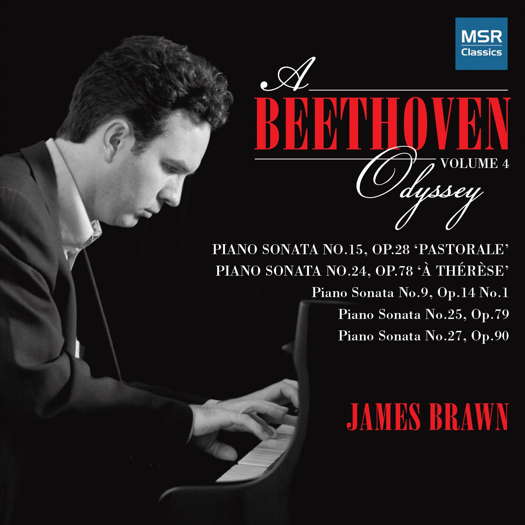 SPONSORED: CD Spotlight. Pure Magic - James Brawn's continued Beethoven Odyssey, awaited by Andrew Schartmann.
SPONSORED: CD Spotlight. Pure Magic - James Brawn's continued Beethoven Odyssey, awaited by Andrew Schartmann.
All sponsored features >>
Carmen Redeemed
JAMES SOHRE reports from San Francisco
As if to purge the very recent past memory of bad boy director Calisto Bieito's mostly reviled production of Carmen, San Francisco Opera has now served up a perfectly agreeable 'traditional' version of Bizet's masterpiece.
The evening was notable for role debuts by two of today's most acclaimed opera stars.
In the title role, J'nai Bridges had all the goods required to make a potent case for the enigmatic gypsy: rich, vibrantly dusky tone in all registers; feline physicality; and appropriately vacillating romantic attentions. Ms Bridges' voice and personality have no trouble communicating her artistry in the large War Memorial Opera House, her substantial mezzo ringing to the rafters. She is also able to scale it back to deliver the requisite sinuous moments that dripped with seductive intent.
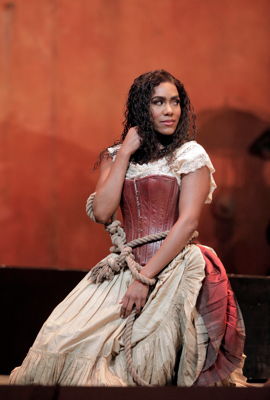
J'nai Bridges in the title role of
Bizet's Carmen at San Francisco Opera.
Photo © 2019 Cory Weaver
If there are a few moments in her traversal that seemed more theatrically calculated than honestly embodied, this was already a notable role assumption by a charismatic performer whose interpretation will only grow in stature as it settles in. The cheering audience clearly knew hers was a very special achievement.
I am not sure I have ever heard any tenor vocalize the role of Don José as meticulously as Matthew Polenzani. His bright, pliant instrument is a perfect fit for the hapless soldier, with the Flower aria breathtaking in its accomplishment. The rising penultimate phrase that has challenged if not defeated many another star held no terror for Mr Polenzani, and he achieved a thrilling effect. He also has plenty of refulgent tone for the passionate outbursts later in the evening.
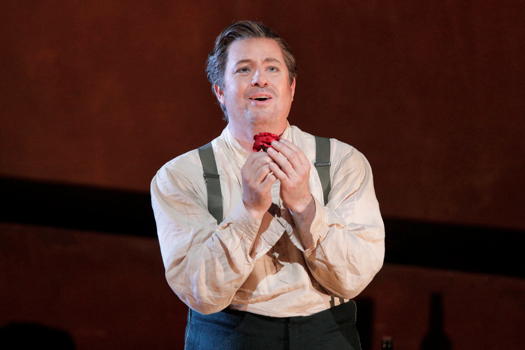
Matthew Polenzani as Don José in Bizet's Carmen at San Francisco Opera. Photo © 2019 Cory Weaver
What he did not seem to have, in his first outing in the part, was a very complex understanding of the man. He seemed so indifferent in his early scenes that it was hard to believe he was bewitched in any way. Indeed, in a directorial flaw, José was seated at a table with his back to Carmen, and could not have possibly known that she threw the flower deliberately to him.
That said, the tenor never seemed to summon enough passion for the gypsy that could possibly render his descent to unhinged despair believable. If he loved Carmen, it seemed to be in the same chaste, almost asexual way he considered Micaëla. This fine singer eventually goes through some decent dramatic motions, but his José at this point remains a good first attempt. But, oh, that glorious voice!
Anita Hartig's pert, delectable Micaëla managed to steal her every scene, her secure singing characterized by an alluring sheen throughout the range. The spunky physical personality she delivers is well matched by the hint of steel in her attractive soprano.
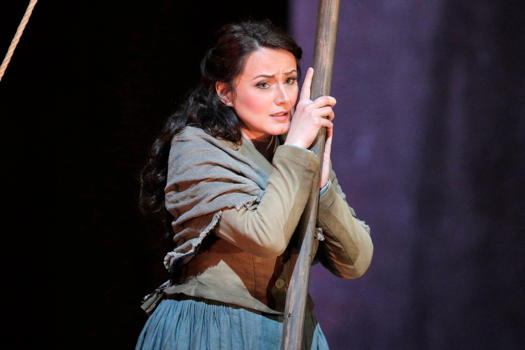
Anita Hartig as Micaëla in Bizet's Carmen at San Francisco Opera. Photo © 2019 Cory Weaver
If Kyle Ketelsen doesn't already own the role of Escamillo, he should. His powerful bass-baritone has both the commanding high range and booming low register that are the requisite arsenal of a great interpreter. Moreover, his strapping, assured presence dominated the proceedings in his every appearance. Mr Ketelsen proved why he is the role's foremost and most sought after interpreter on stages all over the world.
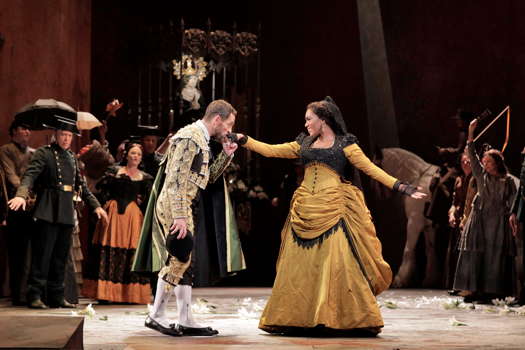
Kyle Ketelsen as Escamillo and J'nai Bridges in the title role of Bizet's Carmen at San Francisco Opera. Photo © 2019 Cory Weaver
All of the smaller roles were winningly cast from the deep bench of the Adler Fellows program. SeokJong Baek was an assured Moralès, his solid baritone married to a scrappy, animated stage presence.
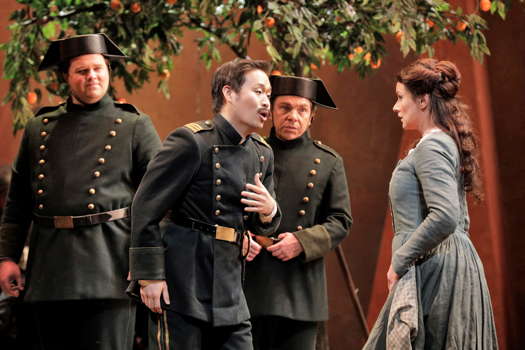
SeokJong Baek as Moralès and Anita Hartig as Micaëla in Bizet's Carmen at San Francisco Opera. Photo © 2019 Cory Weaver
After bullying Zuniga's first few lines, David Leigh's orotund bass rolled forth suavely and commandingly in the house.
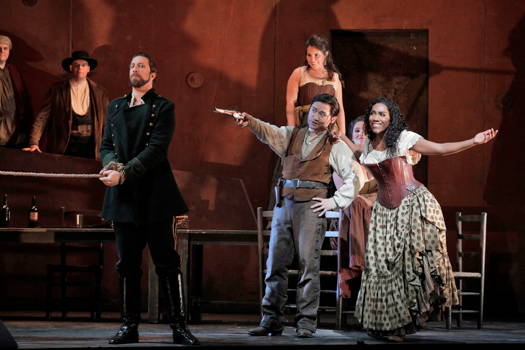
David Leigh as Zuniga, Zhengyi Bai as Remendado, Natalie Image as Frasquita, Ashley Dixon as Mercédès (partially obscured) and J'nai Bridges in the title role of Bizet's Carmen at San Francisco Opera. Photo © 2019 Cory Weaver
The two tenor smugglers were well-served by Christopher Oglesby's meaty, well-modulated vocalizing as Dancaïro, well paired by Zhengyi Bai's pointed, securely presented Remendado. Carmen's two female friends were uncommonly well sung, with Natalie Image offering a silvery, pliable soprano with a gleaming presence as Frasquita, and Ashley Dixon lavishing Mercédès with a ripe, robust, ringing mezzo possessed with lots of ping. These four combined with Carmen to deliver a memorable quintet that was by turns playful, characterful, and breathless.
Ian Robertson's full-throated chorus was a wholly successful participant in the busy staging and they acquitted themselves with distinction. The youth chorus also contributed solid accomplishments in their two appearances, executing well-judged choreography with precision.
The physical production was competent and practical. In some ways Tanya McCallin's design seemed a throwback to the penny-pinching days of the 1970s when cash-strapped companies succeeded in making productions look 'grand' (enough) with modular set pieces.
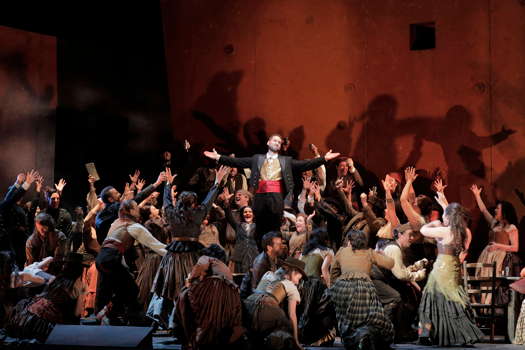
Kyle Ketelsen as Escamillo with the San Francisco Opera Chorus in Bizet's Carmen at San Francisco Opera. Photo © 2019 Cory Weaver
Tall, burnt orange building facades dominate the plaza, with a sole orange tree in its center. A water trough juts into the space from stage right. Once the trough and tree disappear, the walls get suitably re-positioned and re-purposed to suggest tavern, mountain pass and bull ring.
That the visuals never become tiresome is thanks to well-chosen period costumes that provide ample variety and color. The whole proceedings are also tellingly lit with a brooding, moody atmosphere thanks to Justin A Partier, who served as this revival's lighting designer based on Paule Constable's original.
Francesca Zambello's staging found considerable success in investing this thrice familiar piece with fresh ideas while honoring some time worn practices. The crowd scenes were particularly well-rendered, although some more ad lib vocalizations might have further enlivened Act I (as they did Act II and beyond).
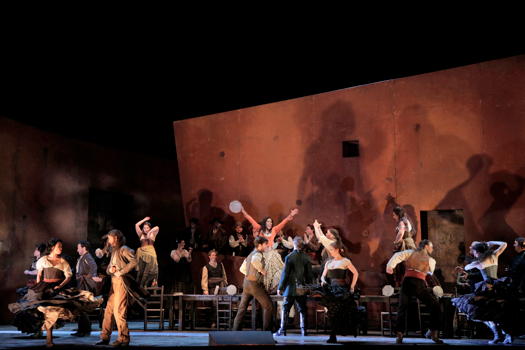
San Francisco Opera Dance Corps, J'nai Bridges as Carmen (centre), Natalie Image as Frasquita and Ashley Dixon as Mercédès in Bizet's Carmen at San Francisco Opera. Photo © 2019 Cory Weaver
While there was a mostly successful attempt to inject some humor into the piece, the 'seductions' on the floor seemed forced, and Carmen's standing above and behind José, lifting her skirt and dropping it over his head misfired. Because José's obsession with Carmen never got well established, the devastating moment in Act IV when he despairingly utters Tu ne m'aime donc plus actually provoked laughter. The good stage pictures and overall clever business compensated for such occasional miscalculation.
In the pit, James Gaffigan led his forces through a well-shaped, idiomatic reading. While the big moments were all once could wish for, Maestro Gaffigan elicited especially radiant results with the score's more introspective passages.
All in all, San Francisco Opera has delivered most everything one could wish in a theatrically engaging, musically stirring Carmen that is worthy of any major international company.
Copyright © 24 June 2019
James Sohre,
Nevada, USA



